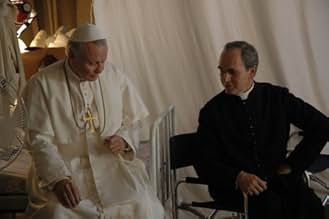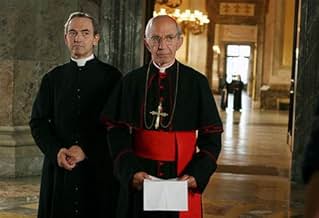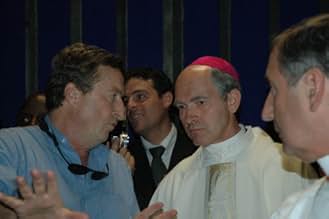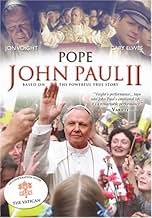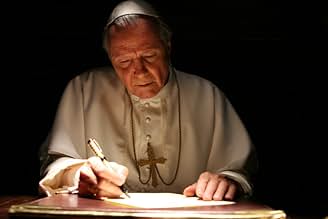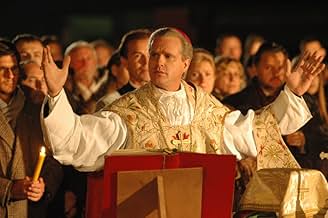VALUTAZIONE IMDb
6,7/10
1303
LA TUA VALUTAZIONE
Cresciuto dal padre a Cracovia dopo la morte della mamma, lo studente Karol Wojtyla lascia i sogni giovanili di recitazione all'inizio della seconda guerra mondiale, sfidando segretamente l'... Leggi tuttoCresciuto dal padre a Cracovia dopo la morte della mamma, lo studente Karol Wojtyla lascia i sogni giovanili di recitazione all'inizio della seconda guerra mondiale, sfidando segretamente l'oppressione nazista nella sua terra natale.Cresciuto dal padre a Cracovia dopo la morte della mamma, lo studente Karol Wojtyla lascia i sogni giovanili di recitazione all'inizio della seconda guerra mondiale, sfidando segretamente l'oppressione nazista nella sua terra natale.
- Candidato a 1 Primetime Emmy
- 3 candidature totali
Sfoglia gli episodi
Recensioni in evidenza
Folks, last night I watched the second and last part of CBS's biopic on Pope John Paul the Great, and as far as I'm concerned, of the three papal biopics I've seen this year, this one is the best, and the most faithful to the late Pope's life.
So far, this is the only biopic that has respected the order of events in Pope John Paul's life. There was good attention to detail: the conclave scene is faithful down in terms of place and ceremony. You may clearly see the cardinals' seats in the Sistine Chapel, as well as the three-cardinal committee that counted the ballots, everything, including the cry of "extra omnes" ("everyone out") preceding the start of the election, was authentic. The ABC's biopic that aired last Thursday rendition of the same moment seemed oversimplified and rushed in comparison.
The real strength of the movie lies in its cast. Cary Elwes played the younger Karol Wojtyla in the movie's first part and I have to say that at times, and from certain angles, he closely resembled the young Wojtyla. But the thing I liked the most is that he projected an *inner joy* and peace that was captivating. Wojtyla was no sourpuss and Elwes "got it right." The only thing that appeared inauthentic is that when he portrayed the late pope's quarry days during the Nazi occupation, he too seemed chubby and well-fed as compared to pictures Wojtyla in pictures taken at the time. The Nazi diet in Poland was not the best fare and it showed in Wojtyla even on his first photos as a priest. Apparently, Elwes hesitated to go into a drastic diet to change his looks so drastically for this role. I can't say I blame him.
For John Voight, this was an Emmy-worthy performance. It helped that Voight resembled the Pope physically, sharing the same square, strong jaw as John Paul. The way Voight captured Pope John Paul's accent and baritone voice was at times pretty scary, so much so that I wonder how much of his lines were lip-synced to existing audio tracks of the late Pope. Voight's countenance when he opened the Holy Doors for the Year 2000 Jubilee so uncannily resembled John Paul's that I had to blink a couple of times to ensure that I was watching Voight and not John Paul. Therefore, kudos and congrats go too to CBS's makeup department for such an outstanding job. Maybe there's an Emmy here for them too.
Voight captured John Paul's physical suffering so much so that it was inspiring. I bet that is not easy to capture a face paralyzed by Parkinson's disease, but Voight did it, down to the trickle of saliva off the side of his mouth at the reenactment of the Pope's last public appearance.
Secondary characters: James Cromwell played Cardinal Adam Sapieha, Wojtyla's first mentor and Archbishop of Krakow during WWII. You might remember from roles as the robot developer and inventor in _I, Robot_ and as the warp drive inventor, Zefram Cochrane in _Star Trek: First Contact_. He did well in this movie.
Christopher Lee played Cardinal Stefan Wyszynski of Warsaw, Wojtyla's other mentor. You may remember that Lee played Count Doku in the last two episodes of the _Star Wars_ prequel. That was weird I feel bad that I've type-casted poor Christopher Lee into a bad guy role for ever and ever.
I also applaud the portrayal of the Pope's "nephews and nieces," his inner circle of friends and spiritual children, from whom Wojtyla learned so much about the human condition. His friendship with "Roman," a Jewish childhood friend was endearing and illustrative of Pope John Paul's big heartalthough I have to say that I don't remember "Roman" from any of the bios I've read about John Paul. Maybe "Roman" is a composite character. The name of the Pope's childhood Jewish friend was different in the other two biopics. That leads me to believe that's probably the case.
One bad point: the scene where the Pope was in his open pope mobile cruising St. Peter's Plaza, with the columnata in the background, and the crowd in front of him, on his way to be shot by Mehmet Ali Agca looked fake through and through. The three "layers" were superimposed and they sort of "shook" out of sync with normal movement. It may me dizzy to look at it. Thumbs down to the special effects people.
All-in-all, it was a great production. As soon as I'm able, I'll get me the DVD.
So far, this is the only biopic that has respected the order of events in Pope John Paul's life. There was good attention to detail: the conclave scene is faithful down in terms of place and ceremony. You may clearly see the cardinals' seats in the Sistine Chapel, as well as the three-cardinal committee that counted the ballots, everything, including the cry of "extra omnes" ("everyone out") preceding the start of the election, was authentic. The ABC's biopic that aired last Thursday rendition of the same moment seemed oversimplified and rushed in comparison.
The real strength of the movie lies in its cast. Cary Elwes played the younger Karol Wojtyla in the movie's first part and I have to say that at times, and from certain angles, he closely resembled the young Wojtyla. But the thing I liked the most is that he projected an *inner joy* and peace that was captivating. Wojtyla was no sourpuss and Elwes "got it right." The only thing that appeared inauthentic is that when he portrayed the late pope's quarry days during the Nazi occupation, he too seemed chubby and well-fed as compared to pictures Wojtyla in pictures taken at the time. The Nazi diet in Poland was not the best fare and it showed in Wojtyla even on his first photos as a priest. Apparently, Elwes hesitated to go into a drastic diet to change his looks so drastically for this role. I can't say I blame him.
For John Voight, this was an Emmy-worthy performance. It helped that Voight resembled the Pope physically, sharing the same square, strong jaw as John Paul. The way Voight captured Pope John Paul's accent and baritone voice was at times pretty scary, so much so that I wonder how much of his lines were lip-synced to existing audio tracks of the late Pope. Voight's countenance when he opened the Holy Doors for the Year 2000 Jubilee so uncannily resembled John Paul's that I had to blink a couple of times to ensure that I was watching Voight and not John Paul. Therefore, kudos and congrats go too to CBS's makeup department for such an outstanding job. Maybe there's an Emmy here for them too.
Voight captured John Paul's physical suffering so much so that it was inspiring. I bet that is not easy to capture a face paralyzed by Parkinson's disease, but Voight did it, down to the trickle of saliva off the side of his mouth at the reenactment of the Pope's last public appearance.
Secondary characters: James Cromwell played Cardinal Adam Sapieha, Wojtyla's first mentor and Archbishop of Krakow during WWII. You might remember from roles as the robot developer and inventor in _I, Robot_ and as the warp drive inventor, Zefram Cochrane in _Star Trek: First Contact_. He did well in this movie.
Christopher Lee played Cardinal Stefan Wyszynski of Warsaw, Wojtyla's other mentor. You may remember that Lee played Count Doku in the last two episodes of the _Star Wars_ prequel. That was weird I feel bad that I've type-casted poor Christopher Lee into a bad guy role for ever and ever.
I also applaud the portrayal of the Pope's "nephews and nieces," his inner circle of friends and spiritual children, from whom Wojtyla learned so much about the human condition. His friendship with "Roman," a Jewish childhood friend was endearing and illustrative of Pope John Paul's big heartalthough I have to say that I don't remember "Roman" from any of the bios I've read about John Paul. Maybe "Roman" is a composite character. The name of the Pope's childhood Jewish friend was different in the other two biopics. That leads me to believe that's probably the case.
One bad point: the scene where the Pope was in his open pope mobile cruising St. Peter's Plaza, with the columnata in the background, and the crowd in front of him, on his way to be shot by Mehmet Ali Agca looked fake through and through. The three "layers" were superimposed and they sort of "shook" out of sync with normal movement. It may me dizzy to look at it. Thumbs down to the special effects people.
All-in-all, it was a great production. As soon as I'm able, I'll get me the DVD.
10promptjo
I commend CBS for airing this excellent biography of Pope John Paul II. I feel it did a marvelous job of portraying his courage, faith and love! There was a continuity from event to event that was not apparent in the biography aired by a rival network a few days earlier. Because of all the Pope did, it was impossible to do an adequate job of showing his life with only a two-hour movie. It is refreshing that an American television network chose to depict the Pope in a positive way instead of denigrating religion as the secular media are often wont to do. I also appreciated being shown how Pope John Paul II turned to God for inspiration when he had choices to make and during his trials. Finally, I think Jon Voigt was able to capture the Pope's sense of humour and his char ism.
I watched both the ABC and CBS versions of the life of Karol Wojtyla. The ABC version was impressive but the CBS miniseries is the one to watch for at Emmy time.
This version opens with the shooting of John Paul II on May 13, 1981. Then we see Karol's earlier life through flashbacks. Sadly, we see only five seconds with his mother, but that scene was wonderful. Add to that about ten seconds of Karol's life as a boy.
From there, we go to Poland in the days of the invasion by the Nazis. Karol is part of a theater group, and he is in college. A number of his friends and even a professor get taken away or killed by the Germans, and he has important choices to make. God's call seems to outweigh all the other factors, and Karol does end up becoming a priest, even though he must break rocks for the Germans. Even while doing that, Karol shows how strong and moral he is. Later, the Communists appear to be less of a threat than the Germans. Maybe so, but they are still manipulating the church for their own purposes.
We see several scenes with Karol's loving father, but for the most part his life is shaped by his superiors in the church, including Cardinal Adam Sapieha. Karol advances more quickly in the church than anyone would expect, making the Communists nervous.
Eventually, a new Pope is needed, and Karol is ready. He seems less reluctant to accept the position in this version, and the election process is shown in more detail (and twice), even using the correct language (which must have been Latin).
As Pope, John Paul II is shown as very loving and caring, interested in the people and in travel, and ready to take on all challenges. World events, especially those affecting Poland, receive a detailed treatment here, and Lech Walesa is a major character.
Cary Elwes did a fine job as Karol in his younger years, showing Karol with quite a sense of humor as well as very intelligent. Jon Voight, who looked less like John Paul II than Thomas Kretschmann, did an amazing job and effectively captured an aging and increasingly frail man who still had faith and a strong desire to serve. All the major actors did an impressive job, but I particularly noticed James Cromwell since I have known him since his days as Stretch Cunningham. Who would have ever believed Stretch Cunningham as a Cardinal? Well, believe it.
The ABC movie may be better for those with a limited attention span. If you want to be entertained rather than educated, this may not be the movie for you, though it includes plenty of entertaining scenes and considerably more laughs than the ABC movie did.
As a work of art, though, the CBS production achieves the excellence broadcast TV often lacks.
This version opens with the shooting of John Paul II on May 13, 1981. Then we see Karol's earlier life through flashbacks. Sadly, we see only five seconds with his mother, but that scene was wonderful. Add to that about ten seconds of Karol's life as a boy.
From there, we go to Poland in the days of the invasion by the Nazis. Karol is part of a theater group, and he is in college. A number of his friends and even a professor get taken away or killed by the Germans, and he has important choices to make. God's call seems to outweigh all the other factors, and Karol does end up becoming a priest, even though he must break rocks for the Germans. Even while doing that, Karol shows how strong and moral he is. Later, the Communists appear to be less of a threat than the Germans. Maybe so, but they are still manipulating the church for their own purposes.
We see several scenes with Karol's loving father, but for the most part his life is shaped by his superiors in the church, including Cardinal Adam Sapieha. Karol advances more quickly in the church than anyone would expect, making the Communists nervous.
Eventually, a new Pope is needed, and Karol is ready. He seems less reluctant to accept the position in this version, and the election process is shown in more detail (and twice), even using the correct language (which must have been Latin).
As Pope, John Paul II is shown as very loving and caring, interested in the people and in travel, and ready to take on all challenges. World events, especially those affecting Poland, receive a detailed treatment here, and Lech Walesa is a major character.
Cary Elwes did a fine job as Karol in his younger years, showing Karol with quite a sense of humor as well as very intelligent. Jon Voight, who looked less like John Paul II than Thomas Kretschmann, did an amazing job and effectively captured an aging and increasingly frail man who still had faith and a strong desire to serve. All the major actors did an impressive job, but I particularly noticed James Cromwell since I have known him since his days as Stretch Cunningham. Who would have ever believed Stretch Cunningham as a Cardinal? Well, believe it.
The ABC movie may be better for those with a limited attention span. If you want to be entertained rather than educated, this may not be the movie for you, though it includes plenty of entertaining scenes and considerably more laughs than the ABC movie did.
As a work of art, though, the CBS production achieves the excellence broadcast TV often lacks.
I watched this film with my Polish girlfriend this morning in a cinema in Krakow... It was dubbed in Polish, so I didn't understand a word that was said (apart from the very basics), but I really enjoyed it all the same...
A very simple and moving story about a honest man who believed in love and peace - simple as that... I am not a catholic (and never will be), but I was really moved by his story...
Jon Voight did a great job as the older pope - could really feel his frustration as the Parkinsons syndrome took hold...
By the way they are going mad about this in Poland - cinema was full at 10.45am on a Monday morning...
Many Thanks to my girlfriend who did her very best to translate for me! You should have seen the look of horror on her face when she realised it was dubbed in Polish and not polish sub-titles!
A very simple and moving story about a honest man who believed in love and peace - simple as that... I am not a catholic (and never will be), but I was really moved by his story...
Jon Voight did a great job as the older pope - could really feel his frustration as the Parkinsons syndrome took hold...
By the way they are going mad about this in Poland - cinema was full at 10.45am on a Monday morning...
Many Thanks to my girlfriend who did her very best to translate for me! You should have seen the look of horror on her face when she realised it was dubbed in Polish and not polish sub-titles!
I have always been a Cary Elwes fan and of course, I love John Paul the Great and will always love the greatest saint of modern times but I was never a fan of John Voight until that Sunday night and now I can say that he is one of the best actors of his day he became the late great Holy Father for ninety minutes. yes the mini series made JP II look like saint, but hey is one. Elwes was fine, too old for his his first hour on screen, but passable. my only complaint was that it was too short and rushed in places. the film was reverently, well acted and handsomely crafted. I think it's crime that Voight is not up for a golden globe but I expect him to win an emmy for this one.
Lo sapevi?
- QuizThis mini-series was approved by the late Pope John Paul II. The project started before his death, and Pope John Paul II was very hands-on with the production and knew of the script. Also, Pope Benedict XVI praised it after watching a screening on November 2005. However, what Pope Benedict XVI saw was a brief cut-down version of Part 1, and all of Part 2, which covers the papacy of Pope John Paul II.
- BlooperAfter Wojtyla accepts the papal election, the cardinals rise and applaud. The camera then pans in towards the new Pope. However, if you look closely, it is actually the mirror image shot from the previous conclave, with John Paul I clearly in the middle of it all instead of John Paul II.
- Versioni alternativeThe theatrical version of the movie shown in Polish cinemas in 2006 is 60 minutes shorter than the original television cut and is not divided into two parts. The dialogs are dubbed by some popular Polish actors and all opening and final credits are printed in Polish. The final credits are accompanied with a song performed by Polish highlanders during John Paul II's visit to Zakopane in 1997.
- ConnessioniFeatured in The 58th Annual Primetime Emmy Awards (2006)
I più visti
Accedi per valutare e creare un elenco di titoli salvati per ottenere consigli personalizzati
- How many seasons does Faith: Pope John Paul II have?Powered by Alexa
Dettagli
- Data di uscita
- Paesi di origine
- Sito ufficiale
- Lingua
- Celebre anche come
- Faith: Pope John Paul II
- Luoghi delle riprese
- Aziende produttrici
- Vedi altri crediti dell’azienda su IMDbPro
- Tempo di esecuzione
- 3h 21min(201 min)
- Mix di suoni
- Proporzioni
- 1.85 : 1
Contribuisci a questa pagina
Suggerisci una modifica o aggiungi i contenuti mancanti

